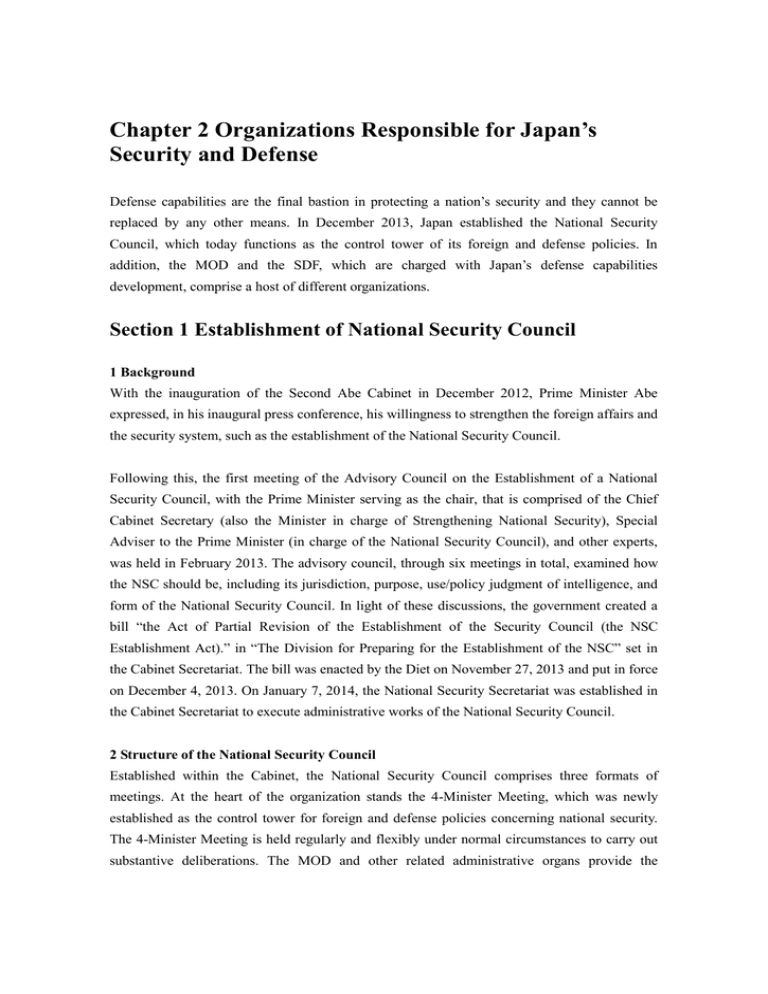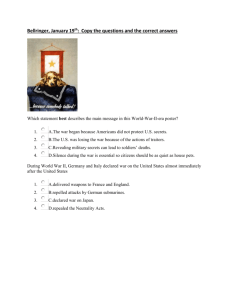Chapter 2 Organizations Responsible for Japan’s Security and Defense
advertisement

Chapter 2 Organizations Responsible for Japan’s Security and Defense Defense capabilities are the final bastion in protecting a nation’s security and they cannot be replaced by any other means. In December 2013, Japan established the National Security Council, which today functions as the control tower of its foreign and defense policies. In addition, the MOD and the SDF, which are charged with Japan’s defense capabilities development, comprise a host of different organizations. Section 1 Establishment of National Security Council 1 Background With the inauguration of the Second Abe Cabinet in December 2012, Prime Minister Abe expressed, in his inaugural press conference, his willingness to strengthen the foreign affairs and the security system, such as the establishment of the National Security Council. Following this, the first meeting of the Advisory Council on the Establishment of a National Security Council, with the Prime Minister serving as the chair, that is comprised of the Chief Cabinet Secretary (also the Minister in charge of Strengthening National Security), Special Adviser to the Prime Minister (in charge of the National Security Council), and other experts, was held in February 2013. The advisory council, through six meetings in total, examined how the NSC should be, including its jurisdiction, purpose, use/policy judgment of intelligence, and form of the National Security Council. In light of these discussions, the government created a bill “the Act of Partial Revision of the Establishment of the Security Council (the NSC Establishment Act).” in “The Division for Preparing for the Establishment of the NSC” set in the Cabinet Secretariat. The bill was enacted by the Diet on November 27, 2013 and put in force on December 4, 2013. On January 7, 2014, the National Security Secretariat was established in the Cabinet Secretariat to execute administrative works of the National Security Council. 2 Structure of the National Security Council Established within the Cabinet, the National Security Council comprises three formats of meetings. At the heart of the organization stands the 4-Minister Meeting, which was newly established as the control tower for foreign and defense policies concerning national security. The 4-Minister Meeting is held regularly and flexibly under normal circumstances to carry out substantive deliberations. The MOD and other related administrative organs provide the National Security Council with data and information pertaining to national security in a timely manner. The National Security Council is charged with deliberating Japan’s basic foreign and defense policies with regards to national security. In December 2013, the National Security Council deliberated and approved the National Security Strategy, National Defense Program Guidelines, and Medium Term Defense Program. The National Security Secretariat established within the Cabinet Secretary provides constant support to the National Security Council. The National Security Secretariat is dedicated to the planning and coordination of basic direction and important matters of foreign and defense policies concerning Japan’s national security, using its general coordination authority. During emergency situations, the National Security Secretariat provides necessary recommendations from the perspective of foreign and defense policies concerning national security. Some MOD members, including regular uniform members, are working at additional posts at the National Security Secretariat. See ▶ Fig. II-2-1-1 (Organization of National Security Council); Fig. II-2-1-2 (Conceptual Image of Holding Meetings) 3 Act on the Protection of Specially Designated Secrets As the security environment surrounding Japan is extremely severe, Japan must further encourage the collection and utilization of information on security in order to ensure the security of the nation and the people. For this purpose, Japan must enhance the reliability of its management of highly confidential information related to national security and seek to further share information among countries concerned. Additionally, to make National Security Council deliberations effective and efficient, Japan must also develop common rules within the government for the protection of secrets and establish a uniform framework for handling national security secrets. Based on this awareness, the Act on the Protection of Specially Designated Secrets was passed on December 6, 2013 and promulgated on December 13, 2013. In order to protect information on Japan’s defense and foreign affairs, as well as the prevention of designated harmful activities (e.g. Counter-Intelligence) and terrorism, which requires special secrecy, the act stipulates: (1) designation of Specially Designated Secrets by the heads of administrative organs; (2) security clearance for personnel that handle Specially Designated Secrets in duty; (3) establishment of a framework for providing or sharing Specially Designated Secrets within and outside administrative organs; and (4) penalties for unauthorized disclosure of Specially Designated Secrets. Excluding certain provisions, the Act is expected to take effect within one-year of its promulgation date. Once enforced, Defense Secrets will be integrated with Specially Designated Secrets and managed in a uniform manner.





